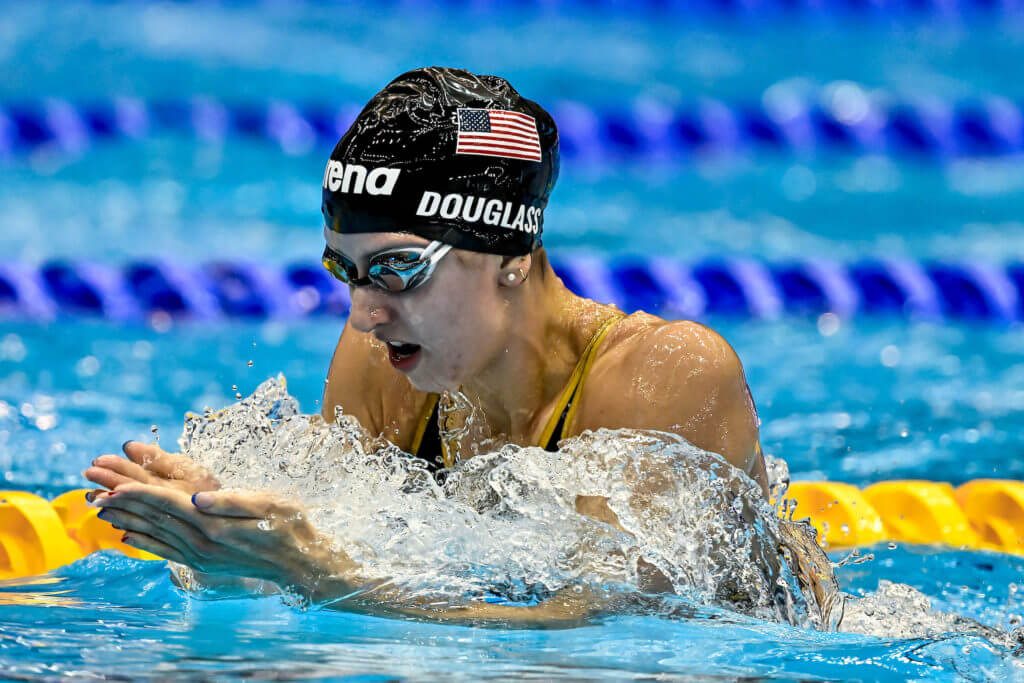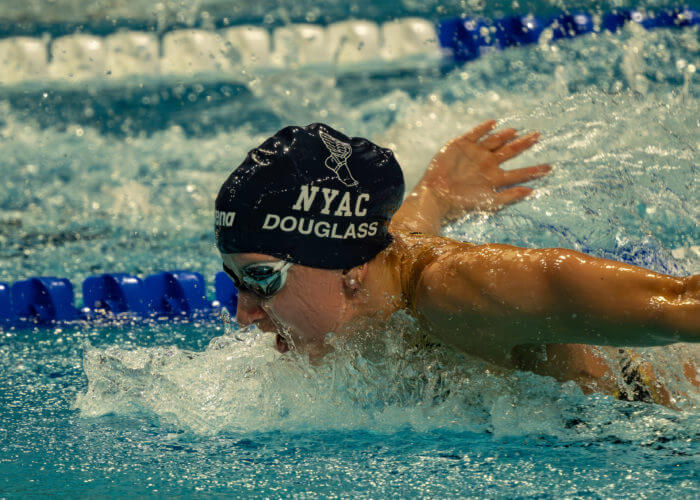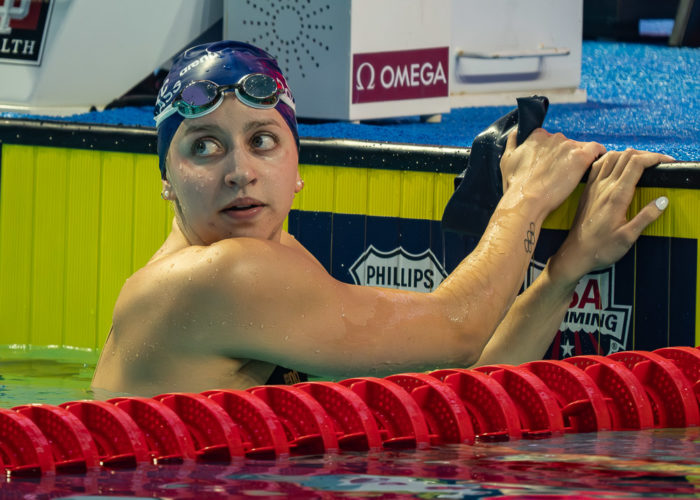Kate Douglass Powers Into Olympic Year As a Cornerstone for Team USA

Kate Douglass Powers Into Olympic Year As a Cornerstone for Team USA
Leading by example, as she did in Virginia’s evolution to an NCAA powerhouse, Kate Douglass has followed the same script internationally as in the NCAA pool. Quietly, unassumingly, with sensational range, she’s become not just a regular on the international stage, but one of the U.S. women’s team’s leaders.
The premise of the question caught Kate Douglass a little bit by surprise in the mixed zone in Fukuoka. By the end of the World Aquatics Championships, though, it seemed truer than at the start.
All of 21 years old, Douglass was not just one of the veterans on Team USA in terms of stature, but in the steadiness of her performances. Team USA turned to her as an anchor again and again to get relays with obvious flaws onto the podium, proving her mettle as a racer on the international stage.
Her standing isn’t just about the 200 IM bronze medal she garnered from her last meet in Japan two years ago at the Tokyo Olympics. It’s not about the short-course medals aplenty she has collected since or the absolute carnage she has brought upon her NCAA opposition.
“It’s kind of weird to hear I’m one of the veterans because I feel like I’m pretty young,” Douglass said. “But it’s true because I’ve definitely been on more meets than a lot of the younger girls here. It’s definitely exciting to take on that role and just kind of show the younger girls that they deserve to be here and they belong here because I know that I didn’t feel that way when I was a newbie. It’s just been a lot of fun.”
As we make the turn toward the Olympic year, it is almost easier to list the events in which Douglass isn’t the American standard bearer. Such is the variety of her brilliance—versatility that once may have been easy to dismiss as a product of the short college pool, but which she has replicated internationally far too often to be an accident.
Douglass’ return of six medals from this summer’s World Championships isn’t just a historic haul. It may prove a tentpole around which an American program that left Fukuoka’s Marine Messe Hall with more questions than answers can orient itself in the final push for Paris.
A KATE OF ALL TRADES
Try to square these next four facts into anything approximating the framework of specialty in modern swimming:
Kate Douglass may be the best American female sprinter right now. Douglass won the 100 free at Phillips 66 Nationals in 52.57 seconds, a half-second quicker than longtime sprint mainstay Abbey Weitzeil and within 3-hundredths of Simone Manuel’s U.S. Open record from 2018. She then finished fourth at Worlds in 52.81, a tenth of a second off the podium.

Photo Courtesy: Peter H. Bick
Kate Douglass is maybe the top 200 IMer in the world. Apply whatever caveats you’d like: Kaylee McKeown’s semifinal disqualification or the absence of Summer McIntosh and her 2:06.89 world junior record from the event. Alex Walsh (silver in Tokyo, gold at Worlds in 2022, silver in Fukuoka) and Douglass will challenge for gold against anyone.
Kate Douglass is America’s top 200 breaststroker at the moment. She sealed that with silver in Fukuoka, trailing only reigning Olympic champion Tatjana Schoenmaker of South Africa. Lilly King, the five-time Olympic medalist, finished fourth and openly (if half-jokingly) cast doubt on which distance is most comfortable for her at the moment.
Kate Douglass is Team USA’s most reliable relay swimmer. While it’s not time to anoint her a latter-day Jason Lezak yet, she was the team’s steadiest hand at Worlds. She anchored the women’s 400 free relay to silver (with the third-fastest leg among non-Australians), the mixed 400 free to silver, the mixed 400 medley to bronze and the women’s medley relay to gold. In the mixed medley, she uncorked a split of 51.79. In the women’s medley relay, she held off the charge of the world record holder, Mollie O’Callaghan, for gold.
“It’s definitely been interesting being the anchor on all the relays this week,” Douglass said in Japan. “But it’s been a lot of fun. I think being the anchor definitely motivates me, and I’ve had some really great splits so far this week. It’s been fun having Team USA rely on me for that spot.”
Add it up, and you get six medals: two gold, three silver and one bronze. You also get the swimmer who, outside of Katie Ledecky, looks at this distance from Paris to be the U.S. women’s best chance to collect gold medals at the next Olympics.
GETTING THERE IS HALF THE BATTLE
Like many Americans, getting to Paris may be the hardest part for Douglass. The last two summers, the native of Pelham, N.Y., has been fairly judicious in picking her program.

Photo Courtesy: Peter H. Bick
The 200 breast seems a lock for her Olympic Trials lineup in Indianapolis. The 200 IM would seem to be as well until you realize that she skipped out on it at International Team Trials in 2022 (the runner-up there, Leah Hayes, went and won a bronze medal at Worlds in Budapest). It’s an event where she has relentlessly improved: She went 2:09.04 at the Olympics, then 2:07.17 in Fukuoka. The piecemeal improvement plan on each stroke in her training with Todd DeSorbo in Charlottsville seems uniquely positioned to generate time drops in the IM.
“I feel like I’ve gotten more confident in that race, especially this year,” Douglass said. “My backstroke leg has gotten a lot better, and my freestyle leg at the end has also really improved.”
The 100 free, with its relay possibilities, is also a cornerstone, even more so now that she’s grown from relay regular to medal contender.
“I think this meet gave me a lot of confidence in my 100 free,” Douglass said. “It gave me a lot of excitement going forward. I want to take on that role in the future. I think that is motivation for next year.”
* * *
From there, Douglass has some freedom. She’s continued to take aim at the 100 butterfly, as difficult a task though that may be. With Torri Huske having a down Worlds by her standards and Claire Curzan missing out at Trials due to illness, the pathway might seem more open. The possibility of ripping a 50 free remains on her program, and the goal of an all-UVA pairing in both of those events with Gretchen Walsh à la Douglass and Alex Walsh in the 200 IM probably provides a little extra motivation.
No one is immune to the rigors of doubles. But Douglass—and her 14 NCAA titles in the last two years—seems about as close to it as one can be. And she’s reached a status internationally where it seems unwise to doubt her.



